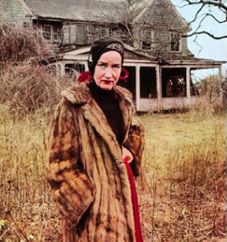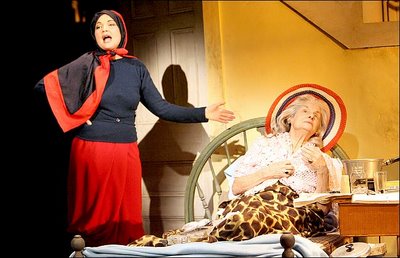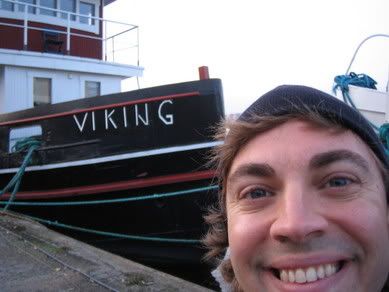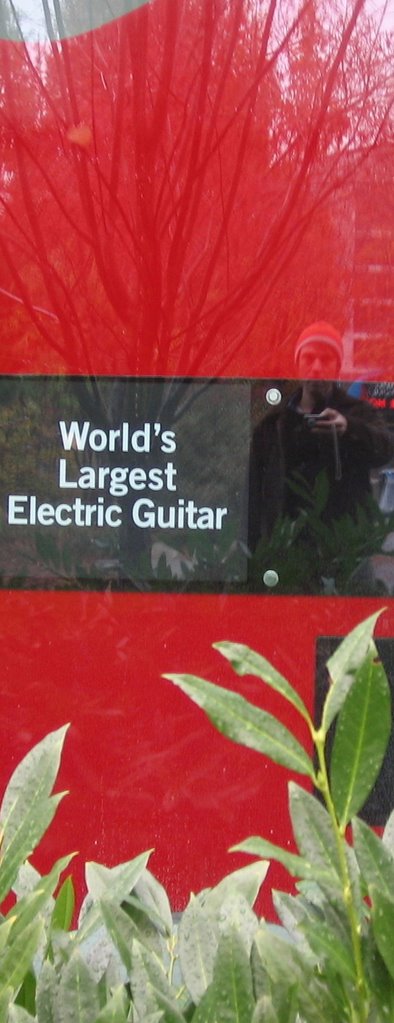26 November 2006
Words vs. Pictures
Look at the difference between my Viking Around blog from my time living in Sweden and this one. VA was nearly all images. I enjoyed playing with the form in Sweden, adding photos and links to David Hasselhoff videos and things. I wanted to share my experiences with friends and family back home. Did I doubt my abilities as a writer to pen an entertaining, insightful blog? Is a picture truly worth a thousand words? That sure saves time.
I look at this blog. Virtually no photos or videos. Links, though. I've learned to do links. The platform has made it easier to do some things. I changed the whole template, for crying out loud. I wonder why I don't incorporate more pictures into my posts. It's almost as if the two blogs are structural opposites.
Easy
On Common Visual Design Elements of Weblogs, the conclusion that "One pattern clearly emerging as a result of this research is that individual webloggers do not tend to make substantive structural changes to the layout of their sites. This confirms one of the predictions / observations leading to this study: that "significant" customization among weblog users is in fact somewhat rare."
That, to me, is an interesting observation. As I just wrote in my last post, I had difficulty changing my initial presentation at first. A sense of permanence overtook me. However, this statistic surprised me. I would have thought that as users became more comfortable with the platform/software/technology, they would experiment more and push the envelope even further. Are the geeks still doing that? And are we just seeing a preponderance of amateur blogs out there and therefore seeing a preponderance of pre-fab templates? Just what is before ponderance?
In My Image
Actually, that raises a question regarding permanence. I changed my blog template earlier this semester. It was a difficult thing to do, because I liked that blank, white slate template. I had always wanted a blank, white slate template. And there I went, jettisoning my dreams. There seems to be a need for great care in creating one's online identity. What will you say about yourself? If people get to know you as one presentation, how hard might it be to change that? Will people respond negatively to a new image? This may go deeper than just trying on a new outfit. It might go so far as to change people's perception of you. Gay folks often hear "I don't know you anymore" when they come out, particularly from their families. "I have to re-imagine everything about you. I have to go through our history together and reexamine everything. I have to re-think." If people got to know me as the blank, white slate, how will they relate to the new blue/green look with the customized headers and footers? If I say, "this is the real me," how will they categorize my past posts? And what if I change it again? Do I have any more or less responsibility to my casual readership than someone like Dooce or Daily Kos have to their sponsored audiences?
20 November 2006
Convention Truth
Please check out the comment thread in this post about the history of blogging conventions. I was mistaken in my understanding of the New York Times article I had read in July. The YearlyKos Convention was not actually the first. CGG and Aldon added some interesting information.
19 November 2006
Colin Must Have LOVED This Article
This was published about 19 months ago. It does demonstrate some of the fear surrounding a new medium. It feels to me that a few memes were perpetuated about blogs early on. Remember the reports of people getting fired for writing about their jobs online? Probably true. Possibly overreactive by the employers and more than likely a less-than-smart move on the part of the employee. But these couple of cases caused a near panic in the uninitiated. "What's this blog? I don't even know what a blog is." I feel we get panicky about our privacy in this country. So, it naturally follows that in a soul-baring medium like the online journal, this is a hot topic.
Not only are the early adopters scrambling to make sense. But then you've got those who are left behind or who are running to catch up who strike fear into the rest to give themselves a better footing. Just sue the pants off 'em to start with. Put the fear of Corporate America into those scrappy bloggers. Don't let anyone know who you are! Or do let people know who you are. Or let them think they know who you are. It's complex, my friends.
WritingAsJoe
His was a more flippant, breezy ponderance (again... ponderosa? Nope. Ponderation? Nope.) on the subject. As I read more of these personal essays on being personal or impersonal, I find more and more different opinions. Some are vehemently against stealth identification. Others couldn't care less.
Wise?
How, you might ask, could I possibly network without revealing my identity? Well, for one thing, I'm learning and benefitting a heck of a lot from reading the work--and receiving the comments of--many other bloggers, anonymous or not. And I'm also not entirely opposed to the idea of "outing" myself to other bloggers I've come to trust.
I am reminded of the first blogging convention that happened this summer. How does a gathering like this work with online personae? Now that Second Life has emerged, might this not be a better place to hold the convention, allowing more bloggers to attend, including those wanting to remain anonymous?
The Wiseass
"...one of this blog's purposes is writing myself into the kind of person I want to be--with a little help from my friends."
How's that for an interesting thought on the subject?
This coincides with Colin's meme of "Do we write our blogs? Or do our blogs write us?"
Blimey!
OK, Here's One
I spent last winter in Stockholm and I did keep a blog whilst there. I wanted to experiment with this new medium and I wanted to connect with folks back home. My handle was the mysterious "ChrisA"and I'm pretty sure nobody figured out who I was.
My big identity struggle came as I worked out the differences between my home culture and my new culture. As I wrote about the difficulties of being an immigrant, of the bizarro-world ways of doing things sometimes and just the humor in it all, I chose, as my audience, Americans—folks back home who understand where I'm coming from. I chose not to share my blog with my relatives and new friends in Sweden. I was objectively viewing their culture, learning about it with respect, but getting a real kick out of the differences. I was afraid I would offend someone with my observations.
So, in my case, it wasn't the pseudonym which kept me anonymous, but my mailing list. Of course, anyone in Sweden could have stumbled across my blog, or my aunt in Jämshög could have called my uncle in Montclair, New Jersey who could have mentioned that I was writing this thing. But, in my own way, I attempted to control the readership just a little bit.
Lady of the Piles
I will continue researching before I offer my own thoughts on the subject of online pseudonyms.
Never Write a Post While Smoking Crack
Without even rereading that last post, I am beside myself. I'm afraid my absence from class caused me to lose momentum. I had been caught up in the McTide of Blogging On. I had gleefully continued utilizing this new medium, exploring it, learning both about it and from it. Then, my new job took me away from it. I traveled. I saw the country. (It's big.) I stayed with friends. Saw some from childhood. It was awesome. Staying with friends doesn't leave you with much time to yourself. To blog. I'd had fantasies of myself alone on the road in hotel rooms at the end of the day's journey. Well, not really alone. I had my blog. But those high school friends, the neighbor-across-the-street whom I met when I was four, my mom's best friend's eldest son who has an eight-week old baby with his partner, all with spare rooms, left me with no time to spend with my blog. My poor, neglected, blue-and-green blog. Perhaps my blog is just blue now.
OK, enough emotional confessions which keep me from doing my real homework.
Chris and Information, sitting in a tree...
I love information. I have oft been quoted as saying, "It's all about learning!" while rifling through a dictionary at a particularly trying moment during a game of Scrabble. Information is gained through education. They go hand in hand, don't they? As a big proponent of education, I enjoy imbibing information (can one actually imbibe information?). How we take it in, process it, store it and use it fascinates me. How do two people look at the same piece of information but interpret it differently? How do they use that same piece of information for different ends? (Look at the divided political groups. Look at the distortion factor.) When we are told, "Just the facts, ma'am. Just the facts," are we able to truly give just the facts? Is all information subjective? Scientists might credit evolution with who we are today, based on what they call "scientific evidence," or facts. Many religious people believe otherwise. They don't take "facts" and digest them in the same way. I might view a crime scene and give the detective "just the facts," but my facts will differ from the facts of another witness. We will each pick up on different things based on our psychologies, life experiences, upbringings, professions, faith systems, perhaps. So, how can we truly pare down the facts to "just the"? Of course, if the car was blue, you'd say, the car was blue. There's no refuting that. Sure, the basic color was blue. But if you ask me to further define the hue, that's where the gray area begins (pun intended).
How can one even write about one's relationship to information? OK, I'll drop the distancing pronoun and simply ask how can I do it? Opting out of the assignment on weak philosophical grounds is not really an option. So, stop whining, you say, and just answer the damned question. (That's a question: Is it damned or damn question?)
I import information into my personal hard drive, otherwise known as my brain. I process that information through the use of thoughts and sometimes even thought processes. Wait, I unintentionally went redundant. "What's your thought process behind that?" leads to an understanding of the interpretation of the information, I suppose. These complex muscular conglomerates we call "mouths" are terrific tools for information spreading. And I use that thing all the time. You are just lucky enough to read what I'm saying, only I'm writing and not speaking, and, at the same time, trying not to edit myself, so as not to get in trouble with the teacher.
How do you, the viewing public, even let me ramble on for this long? Why haven't you switched the channel? In fact, you probably have, unless you're my teacher and you're being paid to stick around. Hey, Colin. Thanks for reading to the end. It is the end. Really.
K-I-S-S-I-N-G would be a great word for Scrabble. Not a whole lot of high-scoring letters, but it uses all seven tiles which is an automatic 50 points.
Thank You
I thank you all because I was unable to attend (being trapped in the Springs of Colorado) and it gave me a good insight into what went on, who said what, who got in trouble and who kissed whom out in the hallway.
17 November 2006
Deal or No Deal

13 November 2006
The Cons of Piracy
To backtrack, I won an award for my paranoid delusions two year ago during the 2004 presidential election. One of my more out-there theories was that John Kerry's membership in the über-exclusive Skull & Bones Society at Yale (Dubya is also a member) trumped his membership in the Democratic Party. I could formulate a hypothesis that Kerry finagled his way into the Democratic nomination, only to throw the election at the end. I felt, you see, that he conceded way too easily, and that after the 2000 debacle, the fact that he wouldn't even entertain a recount seemed fishy to me. I thought that he might have been working for the Republicans all along.
And let me just mention Kerry's bizarre "botched joke" episode at a very sensitive time in the campaign. Kerry could have made it all go away much more quickly than he did. Was this another attempt by Kerry to taint the public's view of the Democratic Party--by making misleading statements, as a Democratic representative, and also by reminding us of all the negative imaging surrounding his own 2004 campaign, by bringing attention to himself?
NOW, we have the suspect Democrat, Joe Lieberman. Read about his turnabout here on My Left Nutmeg. This article sheds some light on some very conservative congressmen who were elected as Democrats only to abandon the party shortly thereafter. It seems awfully underhanded to pull this sort of sleight-of-hand.
I'm only here to put out ideas to chew on, my friends. It is the responsibility of the crown.
From Today's Reading
Despite the high percentage of traffic that goes to the top handful of websites, the internet is still a medium of niches rather than a mass medium. If you want to persuade a mass audience, particularly a geographically concentrated one, television is your tool of choice, supplemented by radio, press outreach, direct mail and robo-calls.
Media Ecology
Media Ecology as defined by three scholars on the MEA website (I took excerpts from longer definitions):
It is the study of media environments, the idea that technology and techniques, modes of information and codes of communication play a leading role in human affairs.
—Lance Strate, “Understanding MEA,” In Medias Res 1 (1), Fall 1999.
One such perspective, or emerging metadiscipline, is media ecology—broadly defined as the study of complex communication systems as environments.
As a perspective, metadiscipline, or even a field of inquiry, media ecology is very much in its infancy.
Media ecology is, in short, a preparadigmatic science.
—Christine Nystrom, Towards a Science of Media Ecology: The Formulation of Integrated Conceptual Paradigms for the Study of Human Communication Systems, Doctoral Dissertation, New York University (1973).
Media ecology looks into the matter of how media of communication affect human perception, understanding, feeling, and value; and how our interaction with media facilitates or impedes our chances of survival.
The word ecology implies the study of environments: their structure, content, and impact on people.
An environment is, after all, a complex message system which imposes on human beings certain ways of thinking, feeling, and behaving.
- It structures what we can see and say and, therefore, do.
- It assigns roles to us and insists on our playing them.
- It specifies what we are permitted to do and what we are not. Sometimes, as in the case of a courtroom, or classroom, or business office, the specifications are explicit and formal.
In the case of media environments (e.g., books, radio, film, television, etc.), the specifications are more often implicit and informal, half concealed by our assumption that what we are dealing with is not an environment but merely a machine.
Media ecology tries to make these specifications explicit.
It tries to find out what roles media force us to play, how media structure what we are seeing, why media make us feel and act as we do.
Media ecology is the study of media as environments.
—Neil Postman, “The Reformed English Curriculum.” in A.C. Eurich, ed., High School 1980: The Shape of the Future in American Secondary Education (1970).
Toilet Paper
The interesting and relevant fact I learned during that trip to the loo is that the number one language used by bloggers is Japanese, followed by English at number two and Chinese at number three.
I'll report back if I learn anything else worthwhile next time I have to take a leak.
Forgive Me
02 November 2006
From the Harvard Boy
It is entitled:
I'm in Seattle now, by the way.
01 November 2006
Grey Gardens

PLEASE find the documentary "Grey Gardens" and WATCH IT.
I finally saw it last week in anticipation of seeing the new musical based on it, now playing on Broadway. My friends were aghast that I, of all people, had not seen this film.
It is about Mrs. Edith Bouvier Beale and her daughter "Little" Edie Beale. It is FASCINATING. They are cousins of Jackie O. and went from glamour and the heights of the society pages to becoming recluses in their dilapidated mansion in Southampton. It is FASCINATING.

I just saw the musical last night. Christine Ebersole was just incredible.
Here she is playing Edie (with Mary Louise Wilson as Edith):

It's amazing what you can get done sitting in yet another airport.
That's Blog-Out-Loud Funny!
Perhaps it's no longer: "For a good time, call..." but "For a good time, visit www...."
The Dangers of Blogging
Was he just acting in accordance with the Administration's policy against free speech? (I should clarify that the Bush Administration doesn't have an outright policy outlawing free speech, but they sure don't like people asking them tough questions or expressing contrary opinions.)

